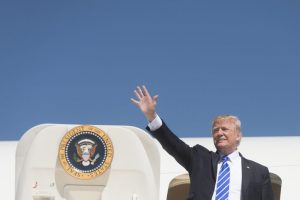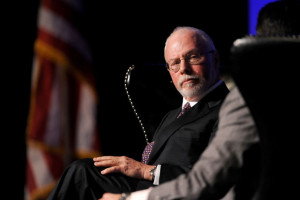The response from hawks in Washington to the unraveling situation for Egyptian President Hosni Mubarak after nearly thirty years in power has been rather telling.
Two important talking points are making the rounds today.
First, The Israel Project (TIP) and the Emergency Committee for Israel’s (ECI) Noah Pollak seem to be running with the strategy of highlighting the contrast between Tunisia, Lebanon, and Egypt’s instability with Israel’s stable, democratic government.
An Israel Project press release (H/T Justin Elliott) observed:
All this illustrates, perhaps more dramatically than ever before, how different Israel is from all its neighbors. As a lively, boisterous democracy, the events unfolding on Arab streets across the region would be unthinkable in Jerusalem or Tel Aviv.
TIP concludes:
There are no easy answers to Washington’s dilemma. But the overall lesson is clear. The United States needs more democratic friends in the region. Friends it can rely on. Friends like Israel.
Noah Pollak tweeted:
I hope the “realists” who think the U.S. should end its alliance w/ Israel are learning who is genuinely stable & strong in the ME.
TIP’s condemnation of authoritarian Arab leaders overlooks the fact that a number of them have been backed by the U.S., in no small part due to leaders like Mubarak being willing to make peace with Israel.
While TIP and Pollak prefer to portray the Israeli-Palestinian conflict as having played no role in shaping the region’s political landscape—such an acknowledgment might let the dreaded “linkage” argument out of the box—others, such as The Atlantic’s Jeffrey Goldberg, are torn between a commitment to liberal democracy and their jobs as hawkish pro-Israel advocates.
At 10:51am, Goldberg decided to run with a linkage-denying argument that “these uprisings are offering proof that Israel isn’t the central Arab preoccupation.”
“Fifty years of peace has meant [the U.S.] propping up dictators for fifty years,” he observed.
He elaborated:
Is that such a bad thing? Friends of mine like Reuel Gerecht believe that Arabs, given their druthers, might choose Islamist governments, and that would be okay, because it’s part of a long-term process of gradual modernization. I’m not so sure. I support democratization, but the democratization we saw in Gaza (courtesy of, among others, Condi Rice) doesn’t seem particularly worth it.
Goldberg’s policy of playing the neoconservative Foundation for Defense of Democracies’ Reuel Marc Gerecht off as an expert on Arab streets and a progressive (Gerecht jokes that his own mother thinks he writes too much about bombing Iran) is rather telling of Goldberg’s own beliefs. Even more telling is Goldberg’s torn relationship with democracy when it doesn’t go his, or Israel’s, way. His argument, it would seem, is that backing strongmen who are friendly—or at least complicit in sealing off Gaza—is more important than human rights or democracy.
By 3:50pm, Goldberg was accepting that Mubarak’s days in power could be limited but was still concerned about what role the Muslim Brotherhood might play.
I’m not downplaying the threat the Muslim Brotherhood poses, to America or to Israel. And I fear for the future of the Israel-Egypt peace treaty.
The Weekly Standard‘s Thomas Joscelyn voiced similar concerns, suggesting that Mubarak might be the lesser of two evils. He wrote:
Hosni Mubarak’s regime is no friend of freedom, even though it is certainly an ally against al Qaeda.
In all likelihood, an Egypt dominated by the Muslim Brotherhood (if that is how the turmoil plays out) would be neither.
At the end, both of the arguments we’ve seen emerge today—Israel is stable while Arab states can’t maintain stability; backing U.S./Israel-friendly dictators might just be worth it—tells us a lot about the logical contortions required by those who espouse an ideology of linkage-denial, or “reverse linkage.”
Egyptians are taking to the streets because of disgust with the failed economy, corruption, and abuses associated with Hosni Mubarak’s rule. But Mubarak’s ability to maintain a grip on power is directly related to backing from the U.S — a source of foreign aid that is in no small way connected to Egypt’s peace with Israel.
The Israeli-Palestinian conflict has warped the region’s political landscape and, as hinted at by Goldberg, led the U.S. to back authoritarian rulers. When the only positive thing TIP and Pollak can say about Israel’s role in the situation is that Israel is “stable,” it’s worth examining what cost Israel’s peace with its neighbors–and assistance in maintaining a siege on Gaza–has incurred on the the U.S.’s broader foreign policy interests in the Middle East.





Mubarek the lesser of two evils — somehow one knew that the neocon line would come down to this.
I see reports that the Muslim Brotherhood is becoming increasingly involved in the unrest. The MB appears to think the tide is turning against Mubarak, and is positioning itself to take as much credit as possible if he is ousted. There is also an unconfirmed report that the border with Gaza has been opened.
If this popular revolt does succeed, the MB would be left as the strongest organized group in the country, save the army. I would say the Egyptian-Israeli peace treaty would indeed be in danger if Mubarak falls. And if Mubarek falls, can the pro-U.S. regimes in Jordan and Yemen be far behind? The U.S. would then be left hanging on to the Saudi royal family as its one pillar in the Arab world.
One can look down the road speculatively and see the entire Arab world in revolt, as it were, against the U.S.-Israeli presence in the region. A super-Iran crisis in the making?
As far as the internal position in the Arab states is concerned, if this becomes the Arab world’s 1989, what would come next? It’s hard to believe that “democracy,” even if it were institued in a place like Egypt, could solve that country’s huge social problems. 1989 then turns into 1979 or 1789 — that is, the revolution ends up devouring its children. An Islamist takeover from Cape Bon to the Persian Gulf — now, that would be interesting times.
RE: “[Goldberg’s argument] is that backing strongmen who are friendly—or at least complicit in sealing off Gaza—is more important than human rights or democracy.” – Eli Clifton
FROM FIREDOGLAKE: Please sign our petition to Congress to immediately vote to cut off any American military aid to the Egyptian government. – http://action.firedoglake.com/page/s/egyptfunding
P.S. Firedoglake has called for ending aid to Egypt, citing the teargas canisters we produce being used against demonstrators.